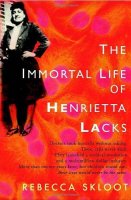 The Immortal Life of Henrietta Lacks by Rebecca Skloot (Broadway Paperbacks, 2011)
The Immortal Life of Henrietta Lacks by Rebecca Skloot (Broadway Paperbacks, 2011)
I was a kid who'd failed freshman year at the regular public high school because she never showed up. I'd transferred to an alternative school that offered dream studies instead of biology, so I was taking [a community college biology class] for high-school credit, which meant that I was sitting in a college lecture hall at sixteen with words like mitosis and kinase inhibitors flying around. I was completely lost.
But it was in that biology class that Rebecca Skloot first heard the name: Henrietta Lacks.
Henrietta died in 1951 from a vicious case of cervical cancer. ... But before she died, a surgeon took samples of her tumor and put them in a petri dish. Scientists had been striving to keep human cells alive in culture for decades, but they all eventually died. Henrietta's were different: they reproduced an entire generation every twenty-four hours, and they never stopped. They became the first immortal human cells ever grown in a laboratory.
By the mid-1970's, when I was working in the University of Rochester's Analytical Cytology Laboratory, the HeLa cell line, as it was called, had been a standard research tool for over 20 years.
[The] cells were part of research into the genes that cause cancer and those that suppress it; they helped develop drugs for treating herpes, leukemia, influenza, hemophilia, and Parkinson's disease; and they'd been used to study lactose digestion, sexually transmitted diseases, appendicitis, human longevity, mosquito mating, and the negative cellular effects of working in sewers. ... Like guinea pigs and mice, Henrietta's cells have become the standard laboratory workhorse.
"HeLa cells were one of the most important things that happened to medicine in the last hundred years," Skloot's professor told her.
What he couldn't tell her, however, was anything at all about the woman behind the cells, Henrietta Lacks herself. The quest for that information would consume much of her life, culminating in this book.
Although The Immortal Life of Henrietta Lacks has special interest for me because of my background in cervical cancer research, such inside information is hardly necessary for finding the book very difficult to put down. Skloot weaves together the story of Henrietta's famous and ubiquitous tumor cells and that of her short and difficult life in such a way that neither the science nor the sorrow becomes overwhelming. Henrietta's cells, holding an honored and essential place in modern biomedical research, contrast sharply with Henrietta's family, which could be the poster child for the poor and marginalized in our country. Reading about their lives in Clover, Virginia confirmed my conclusion that the smartest thing my great-grandparents did was to flee their own hometown on the other side of the Appalachians. Without a doubt, it was harder on Henrietta's family because they were black, but poverty, inbreeding, and, shall we say, non-traditional morals take their toll without regard to race.
The book leaves one with many questions, from medical ethics ("Will our descendants look upon those who profit from people's discarded cells—excised tumors, biopsies, blood taken for newborn testing—as we now look upon 19th century grave robbers?") to social justice ("How can we help someone whose whole community is dysfunctional?"). But I'm left with one especially pressing question, from outside of the book, as it were: How did the troubled teen that Skloot describes herself as end up an excellent and award-winning science writer? There's hope, even for the apparently dysfunctional.
Many thanks to my sister-in-law, the library book sale master, for this gem!
Great review. Fascinating. Thanks!


